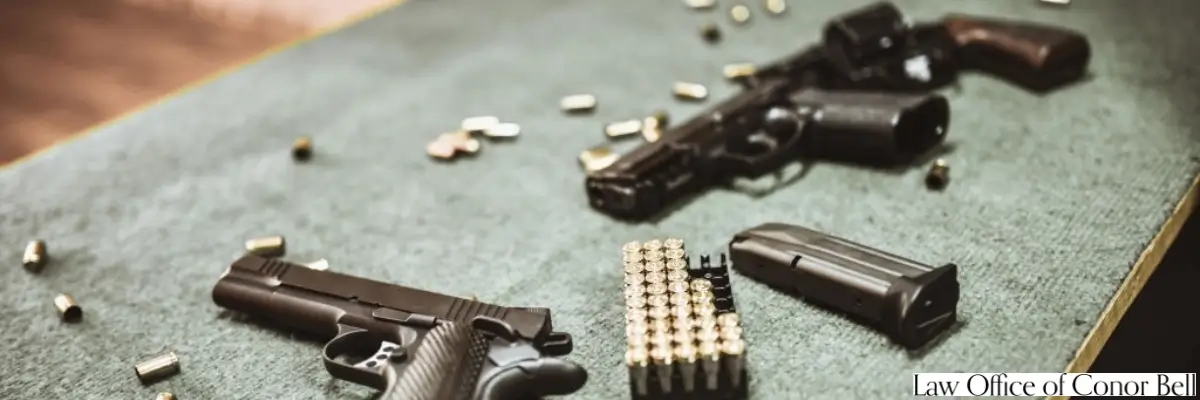Napa Felony Lawyer
Felonies are the most serious crimes in California, and prosecutors are notorious for aggressively pursuing convictions and the harshest penalties available. The consequences of a felony conviction include expensive fines, jail time, and probation, A skilled Napa felony lawyer can help you navigate the complexities of your case, as a criminal record can significantly impact the rest of your life even after you satisfy the terms of your sentence.

Experienced Napa Felony Lawyer for Legal Defense
If you are facing felony charges, learn more about California’s felony laws below, and then contact the Law Office of Conor Bell to discuss your case. Our team of lawyers have extensive years of experience in handling such cases. Talk to our experts today, or book a free consultation with our team of attorneys to discuss your case.
Why You Need a Napa Criminal Defense Lawyer for Your Felony Charge
Every American accused of any criminal offense is guaranteed the constitutional right to legal counsel. Some defendants accept the public defender appointed by the court because they wish to move the process forward as quickly as possible. Although many public defenders are hard-working professionals, they carry heavy caseloads, meaning they do not have the time, energy, or resources to provide the individual level of attention that your case needs. The only way to ensure you have the best chance at avoiding a conviction, reducing penalties, or dismissing the charges altogether is to hire an experienced Napa criminal defense attorney to defend you.
Felony Charges in California Case
California law classifies different crimes as either misdemeanor or felony charges based on the severity of the crime, and convicted offenders receive specific penalties based on this designation. Misdemeanors are punishable by up to one year in county jail, while felony convictions generally involve more than one year in state prison. Some crimes (straight felonies) are always charged and sentenced as felonies, such as murder, rape, and vehicular manslaughter with gross negligence. Other crimes are considered “wobbler” offenses because they may be charged as misdemeanors or felonies based on the defendant’s criminal history and the specific facts of the case. Examples include domestic violence, theft, and assault with a deadly weapon.

Penalties for a Felony Conviction
Felony sentencing in California can include a maximum fine of $10,000 or imprisonment in county jail or state prison. Certain criminal statutes set the penalties for convictions of specific crimes and stipulate where the sentence must be served. Mitigating or aggravating factors can also affect the sentence. In most cases, mitigating factors reduce the severity of a sentence while aggravating factors increase the severity.
Essential questions for mitigating factors include:
- Did the accused play a minor role in the crime?
- Was the alleged victim an initiator of force or violence?
- Was the accused suffering from a mental illness when the crime was committed?
- Did the accused make restitution to the victim?
Important questions for aggravating factors include:
- Did the crime involve severe violence or significant bodily injury?
- Did the accused use a deadly weapon during the commission of the crime?
- Does the accused have prior convictions?
- Was the victim a minor or particularly vulnerable?
- How was the offense committed?
What to Expect From Your Felony Case
After you have been arrested and detained on suspicion of a felony crime, your court case will consist of the following stages:
- Arraignment and Plea Submission: You will make your first appearance in criminal court at the arraignment. If you cannot afford private legal representation, you can explain your financial situation to the judge under oath. If you qualify, the court will appoint a public defender to handle your case. At the arraignment, the judge will read your constitutional rights and explain the charges filed against you, and then your attorney will enter a plea of not guilty, guilty, or nolo contendre (no contest).If you plead guilty, the judge will enter a conviction in the court record. Nolo contendre means you do not disagree with the charges and is similar to a guilty plea, except the conviction cannot be used against you in a civil claim. The judge would remand you to custody if you were not already in jail, release you on your own recognizance, or set a bail amount.
- Pretrial Conference: The next stage of the felony court process is a pretrial conference held by both attorneys and the judge to review the strengths and weaknesses of the case and discuss possibilities for disposing of the case before a trial.
- Preliminary Hearing: At the preliminary hearing, the judge will examine the prosecution’s evidence to determine if there is probable cause. If the judge does find probable cause, you must answer to Superior Court with a plea. The prosecution will file a new charging document known as an Information within 15 days of the hearing, and you will be arraigned again.
- Jury Trial: Most felony cases in California are decided through a jury trial. After 12 jurors have been selected, both sides will make opening statements, present case evidence, call and cross-examine witnesses, and make closing statements. The jury will make a final judgment. If you are found not guilty, you will be released. If you are found guilty through a unanimous vote, the case will proceed to sentencing unless your attorney appeals. You may be ordered to return to prison to await this formal sentencing or be allowed to remain out on bail.
- Sentencing Hearing: You are entitled to a sentencing hearing if you accept a plea bargain or are found guilty. This hearing allows the jury to consider the presentencing report and any other reports concerning potential sentencing. The prosecution will present aggravating factors, and your attorney will present mitigating factors. The judge will consider these arguments and make a sentencing decision.
What Is Formal Probation?
California judges have legal discretion to convert part or all your sentence to formal (felony) probation. Felony probation typically lasts for two years for non-violent felonies but can extend to three years for crimes like grand theft and embezzlement that involve more than $25,000. A formal probation sentence may include up to a year in county jail, but most people sentenced to formal probation serve little to no jail time. Term limits do not apply to violent felonies or crimes whose statutes designate a specific probationary range.
Contact Us To Protect Your Future
If you have been charged with a felony in California, you need experienced legal representation from a Napa felony lawyer to achieve the best outcome in your case. Former prosecutor Conor Bell has spent years resolving hundreds of cases in criminal court, including jury trials for some of the most severe offenses. When you work with the Law Office of Conor Bell, you can expect dedicated, responsive legal representation and fierce advocacy at every stage of the court process.
